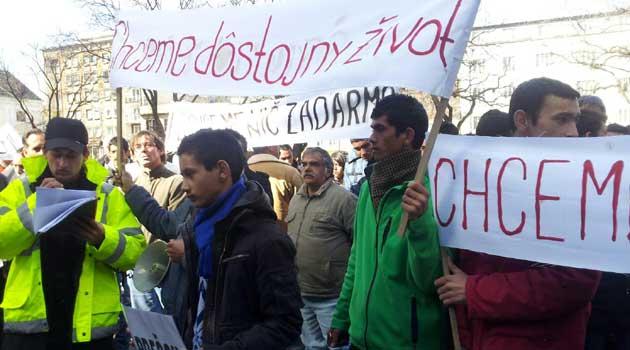Last Tuesday the ruling Směr (Direction) party in Slovakia was joined by opposition MPs to override a presidential veto of an amendment requiring work in exchange for aid to those in material distress. Unemployed persons will have to work at least 32 hours a month in order to receive the state benefit of EUR 61.60.
The amendment should take effect as of January and bureaucrats will spend the first six months of 2014 explaining the new rules to welfare beneficiaries. The bill was submitted by the Slovak Government Plenipotentiary for Romani Communities and the Slovak Labor Ministry.
"This is the first step toward eliminating the tensions that extremists feed on," the Plenipotentiary said. Unemployed persons will lose their benefits only if they refuse to work.
Should no jobs be available, the monies must still be disbursed to the welfare recipients. A family of two adults and two minor children where both parents refuse to work could see their monthly income from the state fall from EUR 156 to EUR 36 (benefits for children and housing will not be affected).
Slovak President Ivan Gašparovič has refused to sign the amendment into law. He suggested unemployed persons be permitted to work off their welfare only as volunteers helping clean up in the aftermath of natural catastrophes, not by performing odd jobs for municipalities.
The president also warned that according to the Constitution, everyone in material distress has the right to have their basic living conditions ensured. The opposition intends to seek a Constitutional Court judgment on the law.
"It reminds me of socialism, I can’t imagine what it will look like in practice," said Vladimír Ledecký, the mayor of Spišský Hrhov in the Levoča district. The Romani minority numbers more than 400 000 in Slovakia, a large portion of whom are long-term unemployed, and this amendment to the law on aid to those in material distress is expected to further sadden their already very problematic lives.
The amendment introduces the obligation to work 32 hours per month for a municipality or in "volunteer services" in order to qualify for basic aid to those in material distress, which is only EUR 61.60 per month. The parliamentary override of the presidential veto of the amendment came not quite three days after Fascist candidate Marián Kotleba won the Banská Bystrice regional elections, and the agreement between the governing Směr party and most of the opposition in parliament to institute such harsh anti-Romani measures is considered an effect of that electoral outcome.
Some politicians have directly admitted that the harsh measures are meant to take the wind from the sails of Kotleba’s anti-Romani rhetoric, thanks to which he won the direct elections for governor. "The aim of the government’s law is not to force anyone to work, it is misleading to speak of this as forced labor. It is very correct to distinguish between people who cannot find work and those who do not want to work," said Viliam Novotný, vice-chair of the SDKÚ (Slovak Democratic and Christian Union).
Novotný warned that if the amendment had not been adopted, the way would have been left open for extremists, a reference to Kotleba. A similar law was also once adopted by the previous right-wing Czech Government of former PM Petr Nečas.
The Czech Constitutional Court, however, rejected welfare beneficiaries having to accept the condition of performing unpaid public work and abolished the law, calling it a form of slavery. The Slovak counterpart to the Czech law could also be abolished by the Slovak Constitutional Court, as the Constitution of the Slovak Republic states that "everyone in material distress has the right to such aid as is essential to ensure their basic living conditions."
